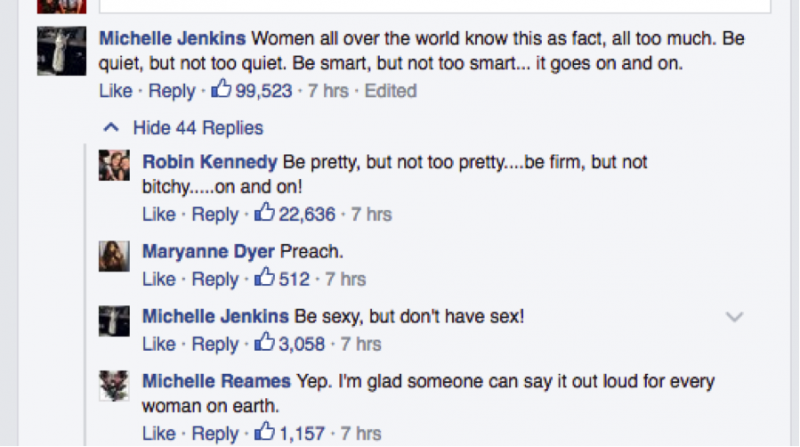For Hillary Clinton, it was a classroom in Harvard with scared law school hopefuls trying to keep her from studying justice. For Malala Yousafzai it was a school bus loaded with an armed member of the Taliban, determined to keep her off her schoolyard soapbox. For me — clearly not saving the best for last here — it was a kitchen in the South with a confused freshman Baptist hell-bent on keeping me away from the pulpit.
Different settings, similar goals: Keep the women from learning too much and leading too loudly, or — heaven forbid — shrilly. Hillary’s now viral appearances in Humans of New York took thousands of women back to the moment (or moments) when they were told how to be or what not to become.
Decades ago, when Hillary was taking a law school entrance exam in a room full of mostly men, a few of those law school hopefuls told Hillary she didn’t belong — or more specifically, “There’s plenty else you can do.” But she continued on with the exam, explaining that she “couldn’t afford to get distracted” because she didn’t want to mess up the exam. So she just kept her eyes on the test, Clinton said, “hoping that the proctor would walk in the room.”
She offered this personal story up as an explanation for her perceived “aloofness.” As a young woman, Clinton explained, “I had to learn to control my emotions. And that’s a hard path to walk.” A hard path, but for many women, a familiar one. One commenter on the post’s thread received over 100,000 (this number keeps growing) likes for pointing out just that: “Women all over the world know this as fact, all too much. Be quiet, but not too quiet. Be smart, but not too smart… it goes on and on.”
The interview ended with a rather jarring comment from Clinton: She acknowledged that many people view her as “walled-off,” “cold,” and “unemotional.” But ultimately, she explained, “I can’t blame people for thinking that.”
Maybe we can’t blame anyone for the unfair, unrealistic expectations put on women in leadership roles, but we should fight to change their skewed standards.
While most women have a moment when someone tried to put them in their place, many women now have other moments where another woman pulled them out of said “place.” For me, it was the instant a female chaplain encouraged me to become a leader on religious council. It’s the Ain’t I A Woman poetry anthology staring at me in nagging encouragement from my bookshelf.
And this encouragement also takes place on a macro-level. For instance, when one woman becomes a congresswoman, a ripple effect occurs. According to the work of researcher Amelia Showalter, if you live in an average state, and you elect a female senator, the female legislative percentage of your state increases by an average 2.88 points.
We need all the points we can get. Currently, In the House of Representatives, there are 362 men and 76 women. In the Senate, there are 17 women and 83 men. But if the research continues to hold up, perhaps Sen. Elizabeth Warren’s seat will awaken the latent political ambition of a younger woman. Maybe a constituent will see a senator lead effectively and become confident enough to vote for a female mayor. And maybe a law school hopeful at an Ivy League will decide not to make an ass of himself during a very important and already stressful exam.
Of course, this progress will not be linear, and likely, it will not be pretty. Especially given the research showing that we are harder on female leaders when they make mistakes than we are on male leaders. To quote Hillary once more in her second Humans of New York interview: “Women are seen through a different lens.”
This separate lens has a damaging impact that spans decades. Even among teenagers — the population subset that’s had the least time to become thoroughly mired in patriarchy — both boys and girls report more confidence in male leadership than in female leadership. It’s hard to trust something we’ve never seen. But hey, that won’t stop a girl from trying.
Got something to say about what you're reading? We value your feedback!

